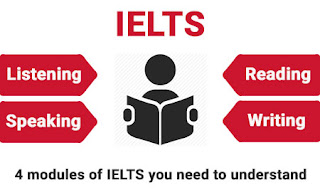How to
Prepare for IELTS Exam?
International
English Language Testing System (IELTS) is the most popular English language
test for Abroad immigration to English-speaking country in the world. If
you’re planning to study, work, or live abroad then the IELTS test is the right
choice for you. Taking an IELTS exam can assist you to achieve your goal.
Which
IELTS test is Right for You?
There
are 2 types of IELTS tests: IELTS Academic Training and IELTS General
Training.
IELTS
will help you to immigrate in another world the world, get a dream job and
Permanent Residency (PR) that you have always wished for or just certify that
you have bettered your English. The IELTS exam you should take depends on what
you wish for.
IELTS
Academic
If you
want to study in an English-speaking country, no matter what it is you
educational qualifications level, you have to take the IELTS Academic test.
IELTS
General Training
If you
want to work or live in an English-speaking country, or just want to improve
your English speaking reading writing and listening skills to get a better job
in an English-speaking country, then IELTS General Training would be the
right choice for you.
How to
prepare for the IELTS test?
The first thing is first before you even open your IELTS test book for
Starting IELTS Exams preparation, make
a schedule for your IELTS Exams study. When preparing for an important test
like IELTS exam, time management is very crucial for everyone so make a
schedule.
Don't
get stressed or study 24/7. This won’t help you to get a better score in IELTS
Exam. The scientific research also bears evidence that spending all your time
studying in a single place can be draining. By changing the study room, you can
easily improve how well you learn and also you join some IELTS Coaching Classes
For better guidance throw Experienced IELTS Trainer.
Surround
yourself with English: Just reading a textbook is not enough to get a higher
score in IELTS Exam. For listening tests, you need to be familiar with several
English accents, including American, British, Australian, Canadian, and New
Zealand.
Practice
as much as you can: As you don’t know exactly what type of content you will be
asked in your IELTS test, it is very crucial that you properly practice so that
you can prepare for every consequence.
Which
is the best website for IELTS Preparation Online and Offline?
IELTS
exam preparation does not stop outside the classroom. There are many free and
paid courses online for preparing for IELTS and Coaching there. Here we will
talk about 5 websites from which you can prepare for IELTS.
1. Super Achievers Abroad Education -- The
IELTS coaching with Super Achievers Abroad Education is the best one in this
question. This is the official website of IELTS Coaching in Gurgaon. You can
join IELTS Coaching Online and Offline mode with an experienced IELTS trainer.
Online classes are one-to-one between the experienced trainer and candidate.
2.PTE Academic coaching — The
PTEExams website is run by an Online IELTS and PTE Test with Online practice
Test.
3.SAAE Online — This is offering you
flexible timing for IELTS coaching in Gurgaon. Along with it, you will join for
PTE coaching in Gurgaon. classes continue over weekdays and weekends. Therefore,
it is very beneficial for professional candidates. Many times candidates forget
to prepare for vocabulary and grammar due to their focus on skills, techniques
and test practice. IELTS Buddy is an awesome website that focuses on vocabulary
and grammar.
4.IELTS
Classes - ieltsclass.in reliable for classroom coaching as well as
online coaching. The success of professionals and students for PR and
student-visa, make it the best IELTS coaching in Gurgaon. Wide-range of study
materials, scoring methods delivered by the examiners of the British Council
make sure success in the IELTS exam.
5.IELTS Coaching Gurgaon - Join
IELTS Coaching in Gurgaon & Crack the IELTS Exam. Rated as the best IELTS
Coaching Center in Gurgaon, Delhi, India, RGA provides training & numerous
mock tests in listening, writing, speaking and reading to get high score in
IELTS Test! IELTS Classes in Gurgaon
6.Youtube Channel — Super Achievers Group:
If you would like to more visual approach for IELTS preparation online, then
IELTS examiner Elizabeth has a very resourceful Youtube Channel.














